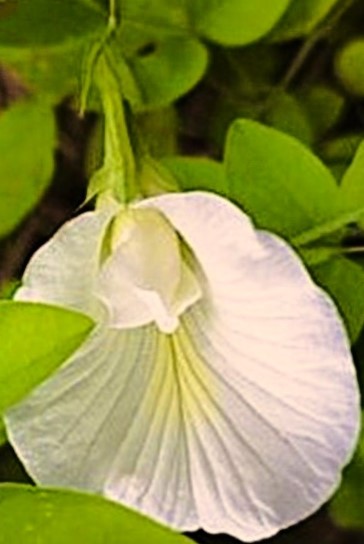Dec 27, 2025
Dec 27, 2025
Time to Reclaim Our Ayurvedic Power
What happens when a nation, rich with ancient wisdom, allows its treasures to slip into foreign hands? Can a country truly rise if it forgets the gifts bestowed upon it by its ancestors? What if the very herbs and plants we revere in our rituals hold the key to some of the world’s most elusive medical cures, yet we fail to protect and nurture them? These questions aren't just hypothetical—they are the stark reality facing India today.
 At the heart of this dilemma is the humble Shankhapushpi, a revered plant used in the worship of Lord Ganesha. The blue or white conch-shaped flowers are believed to be beloved by Lord Shiva and his son, Lord Ganesha. But beyond faith, lies an equally powerful truth rooted in Ayurveda, India’s ancient medical science. Shankhapushpi, long celebrated for its medicinal properties, is no longer ours alone. China, India’s bete noir, with its research and manufacturing prowess, has taken the lead in producing medicines from this sacred plant, while India stands on the sidelines, watching as its Ayurvedic heritage slips into foreign hands.
At the heart of this dilemma is the humble Shankhapushpi, a revered plant used in the worship of Lord Ganesha. The blue or white conch-shaped flowers are believed to be beloved by Lord Shiva and his son, Lord Ganesha. But beyond faith, lies an equally powerful truth rooted in Ayurveda, India’s ancient medical science. Shankhapushpi, long celebrated for its medicinal properties, is no longer ours alone. China, India’s bete noir, with its research and manufacturing prowess, has taken the lead in producing medicines from this sacred plant, while India stands on the sidelines, watching as its Ayurvedic heritage slips into foreign hands.
The Forgotten Treasure of Shankhapushpi
Shankhapushpi (also known as Clitoria Ternatea in Latin), though sacred to Indian rituals, has much more to offer than its spiritual significance. For centuries, this plant has been a cornerstone of Ayurveda. Known to treat a multitude of ailments, from insomnia and mental stress to more serious conditions like cancer and Alzheimer’s, its potential in modern medicine is boundless. And yet, despite this, we find ourselves in a precarious situation: a plant so ingrained in Indian culture and medicine is being better utilized by other nations, while Mother India silently weeps at our neglect.
The irony is painful. In a world where Western medicine continues to search for cures to genetic disorders, Alzheimer's, and neurological diseases, Shankhapushpi holds answers they are only beginning to uncover. It is even known to address ailments such as schizophrenia and seizures, conditions that still baffle many modern doctors. Yet, rather than harnessing its full potential, India has allowed international pharmaceutical giants and neighboring countries like China to capitalize on the herb’s powerful properties.
China’s Grip on Shankhapushpi
China, a nation often criticized for its unconventional culinary practices, has emerged as a surprising leader in herbal medicine research, specifically regarding Shankhapushpi. Today, they are manufacturing and exporting medicines derived from this herb. How did we let this happen? How did a nation that gave birth to Ayurveda fall behind in its own traditional medicine?
China’s interest in Shankhapushpi is not by accident. The plant has been found to impact the nervous system, improving cognitive function and mental clarity. In a world grappling with rising cases of Alzheimer’s, mental health disorders, and cancer, Shankhapushpi offers a lifeline. Yet, it’s China, not India, that is benefiting from this ancient knowledge, leaving India to grapple with its own complacency.
Ayurveda: A Sleeping Giant?
 For centuries, Ayurveda has been a healing force in India, but it is now at risk of being overshadowed by Western medicine and foreign pharmaceutical industries. As Western medicine commercializes sexual dysfunction treatments like Viagra for men, Shankhapushpi offers similar benefits for women, improving reproductive health and mental well-being. But where are the Indian pharmaceutical companies producing and marketing these treatments? Why has India, the land of Dhanvantari (the divine physician), allowed this neglect?
For centuries, Ayurveda has been a healing force in India, but it is now at risk of being overshadowed by Western medicine and foreign pharmaceutical industries. As Western medicine commercializes sexual dysfunction treatments like Viagra for men, Shankhapushpi offers similar benefits for women, improving reproductive health and mental well-being. But where are the Indian pharmaceutical companies producing and marketing these treatments? Why has India, the land of Dhanvantari (the divine physician), allowed this neglect?
The Unani medicine system, though less known today, once flourished in regions like Guntur, thanks to renowned practitioners like Vadapalli Venkateshwara Rao. His simple yet potent herbal remedies attracted kilometers-long queues of patients, seeking relief from ailments that even government hospitals could not address. His practice, though ridiculed by Western-trained doctors at the time, proved that India’s traditional systems of medicine had a place in the modern world. Today, that type of treatment has faded, replaced by a pharmaceutical monopoly that barely acknowledges the wealth of Ayurvedic knowledge at our disposal.
The Way Forward: Reviving India's Heritage
India has a choice. We can sit idly by, watching as foreign companies and nations profit from our traditional knowledge, or we can reclaim our Ayurvedic heritage. The solution lies in empowering Ayurvedic practitioners and establishing a new system of Ayurvedic education that encourages doctors to make medicines themselves. This could decentralize the current monopoly of the pharmaceutical industry and foster employment in agriculture, where herbal plants like Shankhapushpi can be cultivated for use in alternative medicine.
Consider the employment potential in a decentralized Ayurvedic system—from the cultivation of medicinal plants to the production of herbal remedies and the establishment of clinics at the district level. By embracing Ayurveda, India could create not only jobs but also provide affordable and effective healthcare solutions for millions.
Leaders like Baba Ramdev have already begun to breathe life back into Ayurveda, despite facing opposition from leftist and secular forces that aim to suppress traditional Indian medicine. Ramdev’s efforts should not stand alone. A comprehensive national movement is needed—one that starts at the grassroots level, educating and empowering the youth to protect and promote India’s medical heritage.
Mother India's Call to Action
Today, as China reaps the benefits of our ancient knowledge, Mother India watches, weeping for the loss of her sacred heritage. The Vedic scholars who warned that the plants used in Lord Ganesha’s worship must be cultivated and protected knew the importance of safeguarding this knowledge. But our leaders, preoccupied with secularism and global recognition, have allowed this wealth to slip through our fingers.
The path forward is clear. We must revive our commitment to Ayurveda, starting with the cultivation of plants like Shankhapushpi. Let this be a wake-up call to the youth, the future leaders of India: it is time to reclaim what is rightfully ours. If we fail to act now, the world will continue to profit from our indifference, and Mother India’s tears will be the only reminder of what we’ve lost.
Images (c) istock.com
21-Sep-2024
More by : P. Mohan Chandran

|
It is high time, our Government at the Centre gave serious thought to this issue and drew up concrete plans to prevent further drain of indigenous knowledge by the constitution of vigilant bodies and additional empowerment of existing ones. Your writing is very timely, Sir. |

|
There are scores of greedy ‘business’ ventures which exploit Ayurvedic and other indigenous know-how to make a fast buck through sukha chikitsa centres. You can spot hundreds of them even across the small State of Kerala. While making money by luring curious foreign tourists and the gullible local rich, can’t they also participate in the country’s endeavours to stop our rich heritage from falling into foreign hands? Afterall, isn’t this knowledge their very bread?! |

|
Yes, the West has stolen and is still stealing much of our ancient knowledge. They have clandestinely made innumerable patents too out of stolen knowledge. And such stealing is not limited to only herbal medicine. It extends to several scientific fields. I don’t want to labour into that area as much has already been said and written on that count by other patriotic Indians. |

|
Sir, I am afraid we can’t put our neighbour China in league with the West. China shares our ancient traditions/knowledge and, as such, they are perhaps heir to ancient blessings like Shankhupushpa and other herbal remedies. We have to remember that acupuncture belongs to them and we do reap its benefits today as does the West. Such is the case with the philosophy of Tao and Confucius, which are very close to Indian metaphysics. |